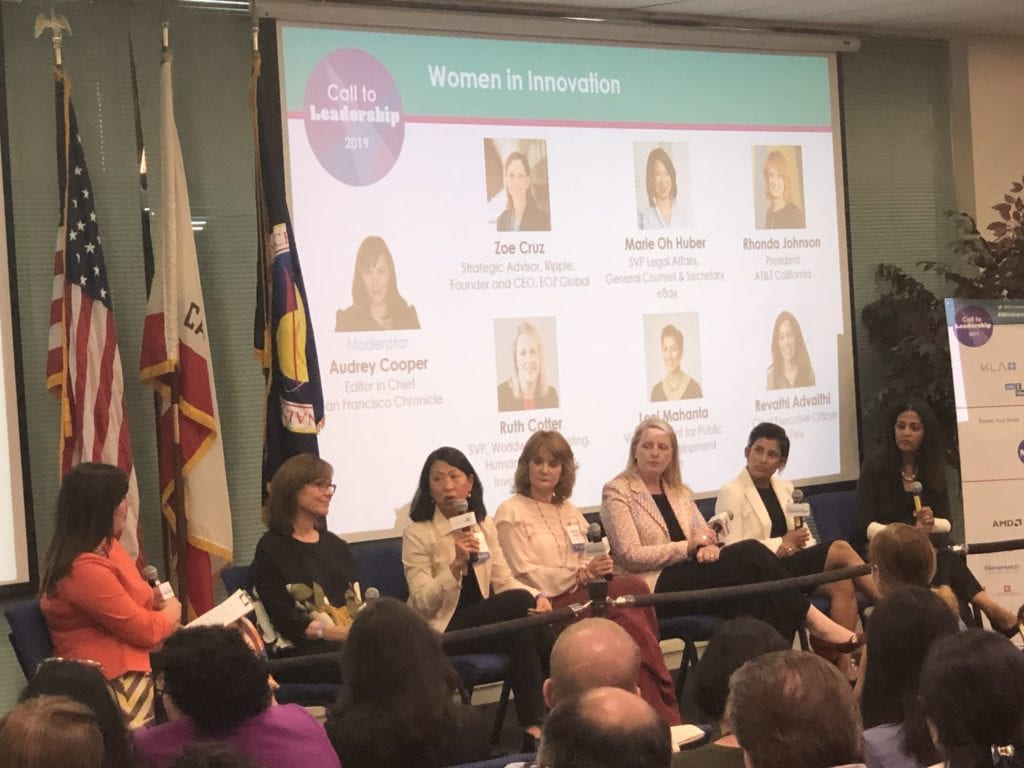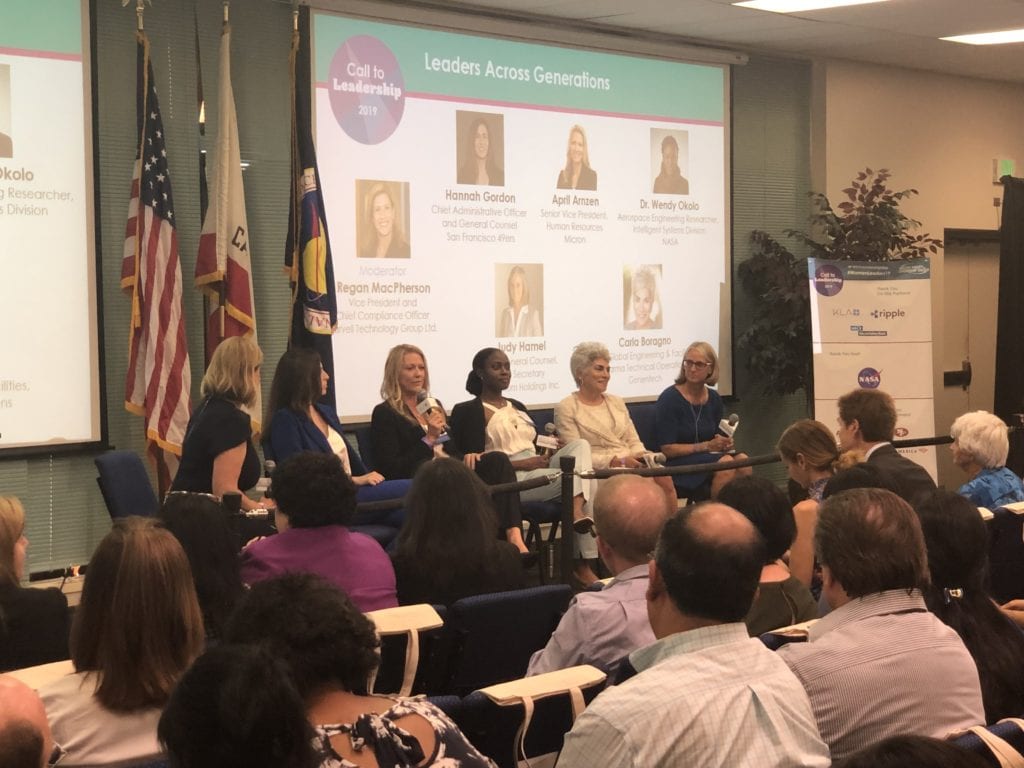Monday marked Women Equality Day and in Silicon Valley, more than 20 high-ranking female business and government leaders convened to share their stories and hard-earned lessons.
The event, hosted in a modest, single-story building at NASA’s Ames Research Center, was filled with some of the most accomplished women in Silicon Valley and the country, including Speaker of the House of Representatives, Nancy Pelosi. It was organized not only to celebrate the holiday, but also to kick off a yearlong series by the Silicon Valley Leadership Group recognizing women leaders as the United States hits the 100-year anniversary of women getting the right to vote.
The day culminated with a fireside chat with Pelosi and Rep. Anna Eshoo, whose district includes Silicon Valley. (Read more about that discussion here.) But first, two lively, woman-filled panels — one called Women in Innovation and another called Women Leaders Across Generations — stretched through the afternoon.
And despite the topics of the discussions being so different, both panels touched on existing disparities between men and women in the tech industry and mentorship, underlining how topical and far-reaching those conversations are today.
Here are some of the takeaways and words of wisdom from those high-ranking and influential women:
Women in Innovation
Moderated by the San Francisco Chronicle’s Editor-in-Chief Audrey Cooper, the Women in Innovation panel included:
- Zoe Cruz, strategic advisor for Ripple and the founder and CEO of EOZ Global
- Marie Oh Huber, senior vice president of legal affairs and general counsel and secretary for eBay
- Rhonda Johnson, president for California at AT&T
- Ruth Cotter, senior vice president of worldwide marketing, human resources and investor relations at AMD
- Loni Mahanta, vice president for public policy development at Lyft
- Revathi Advaithi, chief executive officer at Flex

Women are making strides toward achieving greater parity between males and females in education and the workforce, according to a recent Pew Research Center report, though there is still a long way to go.
A recent study out of Cornell University estimated that it will take a century for women to catch up to men in the computer science sector. One piece of that issue is young girls “opting out” of STEM fields early on before giving it a chance in college, said Advaithi, whose 14-year-old daughter is an example of that trend as she pursues a career in photography.
“It absolutely matters,” Advaithi said of women not entering technology fields. “You see that so many young girls opt out of STEM programs in middle school and high school. I coach and mentor a lot of kids in high school and they opt out even before they try it because they think it’s too difficult.”
Those young women who do pursue such studies, then often opt out of heavy engineering, like what Flex does, which has impacts on the company’s pipeline of talent, she said.
Cruz looks at the future a little more optimistically. She’s seen gaps begin to close when it comes to supporting women as they take on new roles at companies.
“The pipeline is important, but what happens when you’re rising through the ranks is also important,” she said. “It makes a lot of sense for our society to get that right, so I think there will be a tipping point and it … will be much before a hundred years.”
But how to speed up that process?
Mentors and advocates who want women to have a seat at the table is a key component, according to the panelists.
And when women get into those meetings, it’s critical to speak up, even when invited initially just to take notes, Johnson said, speaking from her own experience. She advises finding “friendly faces” in the company and working with them to make strides.
“Part of it is you talk to the people that are organizing the sessions, and you also need to think about what you say to add value,” Johnson said. “Don’t just sit back, take a seat.”
Women Leaders Across Generations
Moderated by Regan MacPherson, vice president and chief compliance officer for Marvell Technology Group, the Women Leaders Across Generations panel included:
- Hannah Gordon, chief administrative officer and general counsel for the San Francisco 49ers
- April Arnzen, senior vice president of human resources for Micron
- Wendy Okolo, aerospace engineering researcher in NASA’s Intelligent Systems Division at the Ames Research Center
- Carla Boragno, senior vice president of global engineering and facilities and pharma technical operations at Genentech
- Judy Hamel, senior vice president general counsel and secretary at Lumentum Holdings Inc.

America has no shortage of inspiring women throughout history, but the female leaders on the Women Leaders Across Generations panel were just as eager to talk about the past as they were to discuss paving the way now for women and underrepresented groups for future generations.
The panelists had no shortage of ideas about how companies and agencies can become more inclusive, improve gender parity and advance women in the coming years. Among those suggestions: using technology to remove demographic identifiers — like gender and ethnicity — from resumes and using software programs that can help make job postings more gender-neutral.
“Research is showing that the language used in job applications … can be tailored toward a specific gender,” Okolo said. “You can make a job post gender neutral or even tailor it to females and you will not detract the male applicants from applying.”
Other panelists advocated for companies to equalize the pay that men and women earn for doing the same work and invest in programs that encourage young girls to pursue STEM careers.
“We know that the way to truly have equal pay for men and women is to really make sure that women are represented at all levels in a company,” Arnzen said.
Amenities like onsite daycares, mothers’ rooms and flexible parental leave policies are also key to helping to bridge the gap, several panelists agreed.
But one of the most important opportunities to open pathways for women, some said, is addressing long-standing, often unconscious biases before and during interviews.
“We all have it (unconscious bias), it’s very prevalent and it’s unconscious, so people aren’t even aware that they’re making those decisions,” Hamel said. “But through education and making people aware of that — that’s kind of the thought process they may be going through without even knowing it — is going to start tipping the needle.”
Contact Janice Bitters at [email protected] or follow @JaniceBitters on Twitter.



Leave a Reply
You must be logged in to post a comment.